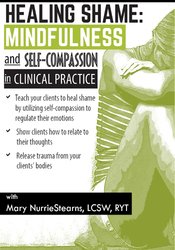Description
- Teach your clients to heal shame by utilizing self-compassion to regulate their emotions
- Show clients how to relate to their thoughts
- Release trauma from your clients’ bodies
Shame is epidemic, and at times invisible, yet it undergirds addictions, PTSD and depression. Shame needs loving attention so that it can relax its grip on mind and body. As clinicians, we need to approach shame gently and safely so that it is released rather than reinforced.
Conclusive research shows that mindful self-compassion releases the body and mind of shame imprints and embeds kindness and understanding in their place. Mindful compassionate practices as therapy interventions are infusing clinical work with hope, healing and positive outcomes.
Join Mary NurrieStearns for a highly experiential day of training. Learn how to:
- Teach your clients to heal shame by utilizing self-compassion to regulate their emotions
- Show them how to relate to their thoughts
- Release trauma from your clients’ bodies
An expert presenter, Mary’s teaching is light-hearted and relevant to your work. Infused with practical clinical examples and practices that you try for yourself this seminar focuses on how to utilize mindful self-compassion as a powerful clinical resource in your day to day work. You will leave the seminar with understandings and skill sets for yourself and your clients.
CPD
CPD
- PESI Australia, in collaboration with PESI in the USA, offers quality online continuing professional development events from the leaders in the field at a standard recognized by professional associations including psychology, social work, occupational therapy, alcohol and drug professionals, counselling and psychotherapy. On completion of the training, a Professional Development Certificate is issued after the individual has answered and submitted a quiz and course evaluation. This online program is worth 6.25 hours CPD for points calculation by your association.
Objectives
- Identify the three key components of self-compassion.
- Describe research supporting therapeutic benefits of mindful self-compassion.
- Summarize the difference between self-compassion and self-esteem.
- Explain shame roots, physiology and cognitive narrative of shame.
- Apply specific mindful self-compassion practices that regulate emotions and heal shame.
- Demonstrate mindful self-compassion interventions that create emotional resiliency, dis-identify from shame.
Outline
Toxic Shame
- Interpersonal origins – cultural, developmental and trauma
- Causes of shame in men, shame in women
- Physiology and narrative of toxic shame
- Self-criticism, self-protection, shame collapse triangle
Research on the Healing Power of Self-Compassion
- Mindfulness as the foundation of self-compassion
- Components of self-compassion
- Physiology and neuroscience of compassion
- Research on how yoga heals toxic shame
- Self-compassion as intervention for low self-esteem
- Self-compassion for emotional resiliency
Repairing Toxic Shame Using Mindful Self-Compassion Skills
- First Skill set –cultivating safety with heart centered mindfulness, and/or sensory awareness practice
- Second skill set– emotional regulation and calming body with body centering, gentle yoga movement and/or breathing awareness
- Third skill set – naming thoughts, reflection (I am not my story), inquiry and understanding, larger perspective
- Fourth skill set– naming and taking care of painful emotions, including grief, with compassionate self-talk, cultivating inner loving mother
- Fifth skill set – using self-compassion to make desired changes
Practices of Self-Compassion and Clinical Uses
- 3 part self-compassion letter- embrace shame like loving mother
- Compassion prayer to self – softening resistance to compassion
- Tonglen practice – link shame to compassion
- Healing self-touch, comforting self-talk – regulation of painful emotions
- Self-compassion break –accessing self-compassion
- Heart centered yoga – for healing the physiology of shame
- Experience these practices for yourself
Necessity of Self-Compassion for Therapist
- Empathy vs compassion in your brain
- Importance of healing presence
- Modeling self-compassion
Target Audience
Addiction Counselors, Counselors, Marriage & Family Therapists, Psychologists, Social Workers, and other Mental Health Professionals

